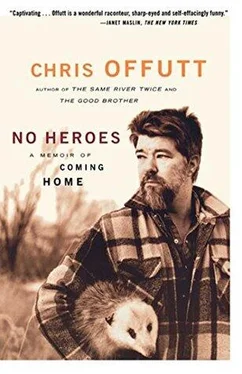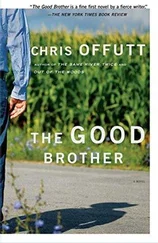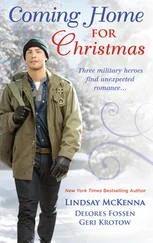He looked at me hopefully, recognizing the enthusiasm in my voice.
“I’ll buy your goddam car,” I said.
“Do you have the money?”
“Hell no, I’m broke. But what we can do is write it into the closing contract.”
“How’s that?”
“I knock the price of the car off the house cost. You give me a check for the original amount, and I write you one for the car.”
“It might work,” he said. “Sort of like throwing in the car as boot.”
“Right, I have to buy a car to sell the house.”
Dale called his banker and laid out the deal. I watched his face shift from hope to despair as he listened. His shoulders slumped and he hung up the phone.
“No dice,” he said. “The car has to be out of my name before the debt ratio changes. You have to buy it first, but you don’t have the money.”
“It can work, Dale. We just have to trust each other.”
“What do you mean?”
“You transfer the title to me now. I pay you at closing.”
“What happens if you wreck it, Chris?”
“I won’t.”
“But what if you do?”
“I won’t drive it, Dale.”
“You could turn around and sell it.”
“Yes, but if your loan falls through, I’m left owing you money I don’t have. Plus I own a car I don’t need.”
“It might work. We’ll add a clause that says if the loan fails the car goes back to me.”
“That’s a good idea,” I said.
“Will you throw in the appliances?”
“What do you mean?”
“I’m putting a car up. What’s your boot?”
“All right, stove and refrigerator. But not the washer and dryer.”
“Agreed,” he said.
We looked each other in the eye and shook hands. Then we went to the courthouse and transferred ownership for a dollar. A year before I had bought the house without stepping inside. Now I was buying a car that I’d never seen. Later his wife drove it home and he handed me the keys. The car had all the hubcaps and a terrific stereo system with six speakers. It wasn’t as quick as the Malibu, but handled better. The windows remained in place when you rolled them up. The headlights were bright and all the turn signals worked. If you slammed on the brakes, the car didn’t turn sideways in the road. My new Lexus would probably make it to Iowa.
That night, I invited Faron to the house. He parked his massive truck at the top of the drive and swaggered across the yard, his long hair swept over his big shoulders like a Viking. He wore cowboy boots and faded jeans. Faron enjoyed exotic pets such as an ostrich, a wildcat, and elk. He rode horses in shows and attended the drag strip the next county over.
“About time we got rid of you,” he said.
“They offered me a good job and I have to take it — for the kids, you know.”
“Yeah, them boys got to be took care of. You’ll be back, won’t you.”
“Faron, I’ve left here five times. What do you think?”
“You’ll be back. Your mistake was not moving to Haldeman this time.”
“Maybe we need to start our own Haldeman.”
“Haldeman Two,” he said.
“Son of Haldeman.”
“Shit, that’s us, ain’t it.”
“Damn sure is.”
“Chris,” he said, “you know what I remember most? The way you rode your bike faster than anybody in the woods. We’d all be setting somewhere and you’d come down the path like a bat out of hell and aim for the littlest space and stand on your brake and just crash into us. You remember that?”
“No, I don’t.”
“You were the most beat-to-pieces kid on the hill.”
“Sometimes I still feel that way.”
“Your fingers got so stoved-up it’s a wonder you got any left to write your books with.”
“I tell you what I remember, Faron. All us boys looking after each other. It didn’t matter where we were or what we were up to. All that mattered was we were us.”
We looked at each other and rapidly away. We had the past in common, twined memories like fossils lodged in a creekbank. We lacked the language for how we felt. As much as I loved Faron, seeing him made me sad — not at what we’d become, but at what we’d stopped being, innocent children occupying the moment.
“You got a dollar on you?” I said. “Give me a dollar, Faron.”
He dutifully pulled forth his wallet, removed a dollar, and passed it to me. I handed him the title to the Malibu, which I’d already signed and dated.
“You just bought yourself a car,” I said.
He didn’t speak or move. I thought perhaps he didn’t understand what I was saying, or considered it a joke.
“Faron,” I said, “it’s yours.”
He still didn’t answer. His face showed no expression whatsoever and I wondered if I’d accidentally insulted him. I proffered the title.
“Here, Faron. Take the damn title.”
Slowly he reached for the paper, his fingers trembling. He walked away without meeting my eyes. I watched him tow the hot rod off the hill in a drizzling rain. The next morning his girlfriend called and said that Faron parked the car in front of the house and sat in a lawn chair all day, looking at the Malibu. All he did was grin.
I went to the courthouse to pick up the new license plate for the Lexus. On the steps I nodded to a Haldeman boy who was now a lawman. In the hall I nodded to another Haldeman boy waiting to see the judge. My part of the county produced the most outlaws and cops, which made life simpler for everyone.
I waited on a bench for my turn with the clerk. Ahead of me in line were two men in work clothes, clearly brothers, sheepish about being in town. The older one tucked his legs under the bench to conceal his muddy boots. A woman in expensive clothes entered. She obviously shopped in Lexington instead of the mall. The clerk said, “Next,” and the woman stepped to the counter. The brothers and I looked at each other. I shrugged. The older man leaned toward me. “Doctor’s wife,” he said. “Or maybe doctor-teacher,” which meant a professor at MSU. I shrugged again.
When it was my turn, I spoke politely with the clerk, whose sister I recalled from high school. The license plate was remarkably expensive.
“Give you twenty bucks,” I said. “That’s my last offer.”
“Can’t take it,” the clerk said. “They won’t let us jew.”
Arthur calls. Our conversations have stirred his memory.
“A girl went with my mother,” he says, “A friend of mine. She died with my parents. She wanted only to help my mother. She didn’t have to go but she went and she lost her life. She gave her life for my mother. I didn’t, she did. She’s supposed to be in the book, Sonny. How could I forget her?”
“You cant remember everything, Arthur.”
“There is an old Talmudic story. When God destroyed Sodom and Gomorrah, Abraham said, ‘You’re going to destroy the whole city?’ And God said, ‘Show me some good people and I won’t destroy the whole world.’ So Abraham found some and God didn’t destroy the world. That girl, she was one. An angel, Sonny, not a hero.”
“You want her in the book?”
“You think you can squeeze her in?”
“You bet.”
“She deserves to be. From now on I’m praying for her. Because of you and your book, I go back and back. I have more and more people to pray for. That’s all I want to tell you today.”
“Okay, Arthur. She’s in the book.”
“Some names should be preserved. Stella Goclow. Her father was a tie-maker. Very poor. They lived in two rooms. They always had something to eat when you visited their house. She was twenty-five when she… when it happened.”
“I got it, Arthur. She’s in. Her name is preserved.”
“Thank you, Sonny. Maybe all this talking is not so bad.”
Читать дальше












